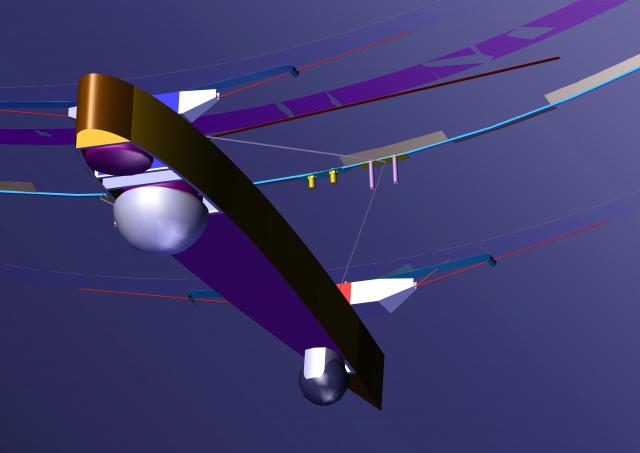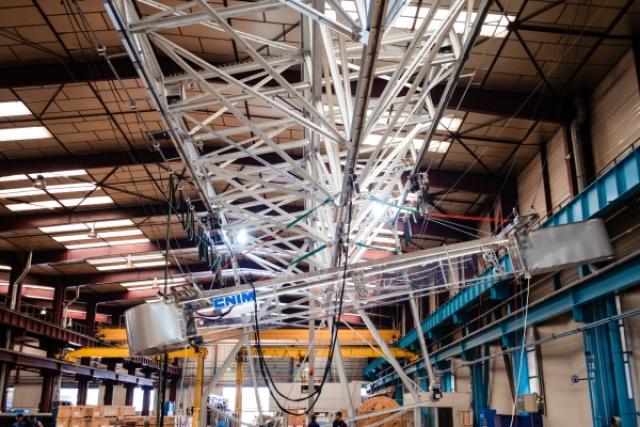4 July 2019
Defense and security
4 July 2019
Defense and security
The “Gondola Mobility System”, a special subassembly on which the Stratobus TM communication and/or monitoring payloads are mounted, will enable the aerostat to rotate around its longitudinal axis.
This is necessary to enable the aerostat’s solar panels to track the sun’s movements in order to efficiently harness its radiant energy. It is a critical system for the Stratobus’s operation and energy independence. The nacelle has been trialled on a full-scale test bed built by CNIM at its workshops in La Seyne. This test bed enabled many parameters to be validated in preparation for the maiden flight.
CNIM, the French industrial engineering contractor and equipment manufacturer, is pleased to report on the latest progress of the Stratobus TM project. CNIM recently completed trials on the suspended nacelle, using a fullscale test bed built at its facility in La Seyne sur Mer. Installed beneath the aerostat, this ultralight carbon composite nacelle will carry mission payloads and enable the aerostat to track the sun’s movement and efficiently harness the solar radiation that powers the entire system. As a result, the aerostat will be able to fly autonomous missions lasting up to one year. The successful trial is an initial technological achievement for CNIM, which is maintaining a dual focus on the project’s technical and economic aspects.
CAD image of the nacelle below the aerostat
Stratobus TM is an 85,000 cu. m airship designed to operate at an altitude of 20 km, in the lower layer of the stratosphere. Equipped with four electric motors powered by solar panels during the day and batteries at night, the vehicle is fully autonomous from an energy perspective and is able to remain on station for a full year. Under ideal conditions it can carry a 250 - 450 kg payload. Stationed just above air traffic and considerably closer to earth than a satellite, Stratobus TM is designed to perform civilian and defense missions in areas such as telecommunications, surveillance, observation and navigation.
CNIM has been working as an industrial partner alongside Thales Alenia Space from the very start of the project, including during initial brainstorming and development of the concept for the original aerostat. Considering our expertise in composite materials for large components, and in extended, complex industrial development projects, we were awarded the contract to supply the rigid structures for the Stratobus TM: the nacelle, the four motor mountings and the mechanical ballast.
Maxime Lauer, CNIM’s Project Manager.
We are delighted to be working with CNIM as a key partner in the Stratobus TM project. CNIM has been involved from the outset, subsequently stepping up its contribution by supplying ground support resources and acquiring AirStar Aerospace. The full-scale mock-up of the nacelle is the result of a joint-engineering stage that demonstrated the viability and robustness of the Stratobus TM autonomous stratospheric aerostat’s heliotropic mechanism
Yannick Combet, Thales Alenia Space’s Project Manager for Stratobus TM
The test bed infrastructure presented measures 30 m in length and stands 10 m tall.
Our integrated industrial plant and technical capabilities were the key to building this large test facility. This is the ideal scale on which to validate a system that is extremely sensitive and must be finely adjusted
explains Maxime Lauer, CNIM’s Project Manager.
Full-scale nacelle mock-up
The current steel nacelle attached to the test bed is the same volume and weight as the planned carbon nacelle (plus payload) that will be installed on the Stratobus TM. This assembly was used to demonstrate that the nacelle is indeed able to rotate the balloon so that it maintains the ideal orientation relative to the sun. A joint patent application with Thales Alenia Space has been filed for the “Gondola Mobility System”.
Following the initial testing phase, CNIM will work on qualifying the production nacelle’s carbon composite material under conditions representative of the upper atmosphere.
With the acquisition of AirStar Aerospace, which was already involved in developing the airship’s flexible fabric shell and creating scale models, CNIM has consolidated its status as a key partner of Thales Alenia Space for the Stratobus TM programme.

